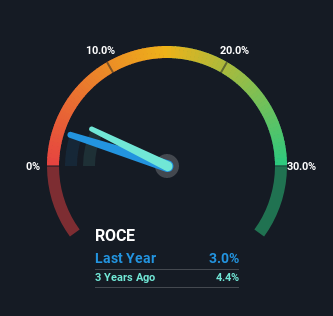- Poland
- /
- Electric Utilities
- /
- WSE:TPE
Returns On Capital At TAURON Polska Energia (WSE:TPE) Paint A Concerning Picture

What financial metrics can indicate to us that a company is maturing or even in decline? Businesses in decline often have two underlying trends, firstly, a declining return on capital employed (ROCE) and a declining base of capital employed. This indicates to us that the business is not only shrinking the size of its net assets, but its returns are falling as well. So after we looked into TAURON Polska Energia (WSE:TPE), the trends above didn't look too great.
Understanding Return On Capital Employed (ROCE)
For those that aren't sure what ROCE is, it measures the amount of pre-tax profits a company can generate from the capital employed in its business. To calculate this metric for TAURON Polska Energia, this is the formula:
Return on Capital Employed = Earnings Before Interest and Tax (EBIT) ÷ (Total Assets - Current Liabilities)
0.03 = zł983m ÷ (zł44b - zł12b) (Based on the trailing twelve months to September 2022).
Therefore, TAURON Polska Energia has an ROCE of 3.0%. In absolute terms, that's a low return and it also under-performs the Electric Utilities industry average of 8.4%.
See our latest analysis for TAURON Polska Energia

In the above chart we have measured TAURON Polska Energia's prior ROCE against its prior performance, but the future is arguably more important. If you'd like, you can check out the forecasts from the analysts covering TAURON Polska Energia here for free.
What Can We Tell From TAURON Polska Energia's ROCE Trend?
In terms of TAURON Polska Energia's historical ROCE movements, the trend doesn't inspire confidence. About five years ago, returns on capital were 6.5%, however they're now substantially lower than that as we saw above. Meanwhile, capital employed in the business has stayed roughly the flat over the period. This combination can be indicative of a mature business that still has areas to deploy capital, but the returns received aren't as high due potentially to new competition or smaller margins. So because these trends aren't typically conducive to creating a multi-bagger, we wouldn't hold our breath on TAURON Polska Energia becoming one if things continue as they have.
On a side note, TAURON Polska Energia's current liabilities have increased over the last five years to 26% of total assets, effectively distorting the ROCE to some degree. Without this increase, it's likely that ROCE would be even lower than 3.0%. While the ratio isn't currently too high, it's worth keeping an eye on this because if it gets particularly high, the business could then face some new elements of risk.
What We Can Learn From TAURON Polska Energia's ROCE
In summary, it's unfortunate that TAURON Polska Energia is generating lower returns from the same amount of capital. Long term shareholders who've owned the stock over the last five years have experienced a 21% depreciation in their investment, so it appears the market might not like these trends either. Unless there is a shift to a more positive trajectory in these metrics, we would look elsewhere.
On a final note, we've found 1 warning sign for TAURON Polska Energia that we think you should be aware of.
For those who like to invest in solid companies, check out this free list of companies with solid balance sheets and high returns on equity.
Valuation is complex, but we're here to simplify it.
Discover if TAURON Polska Energia might be undervalued or overvalued with our detailed analysis, featuring fair value estimates, potential risks, dividends, insider trades, and its financial condition.
Access Free AnalysisHave feedback on this article? Concerned about the content? Get in touch with us directly. Alternatively, email editorial-team (at) simplywallst.com.
This article by Simply Wall St is general in nature. We provide commentary based on historical data and analyst forecasts only using an unbiased methodology and our articles are not intended to be financial advice. It does not constitute a recommendation to buy or sell any stock, and does not take account of your objectives, or your financial situation. We aim to bring you long-term focused analysis driven by fundamental data. Note that our analysis may not factor in the latest price-sensitive company announcements or qualitative material. Simply Wall St has no position in any stocks mentioned.
About WSE:TPE
TAURON Polska Energia
Through its subsidiaries, generates, distributes, and supplies electricity and heat in Poland.
Undervalued with moderate growth potential.
Similar Companies
Market Insights
Community Narratives



